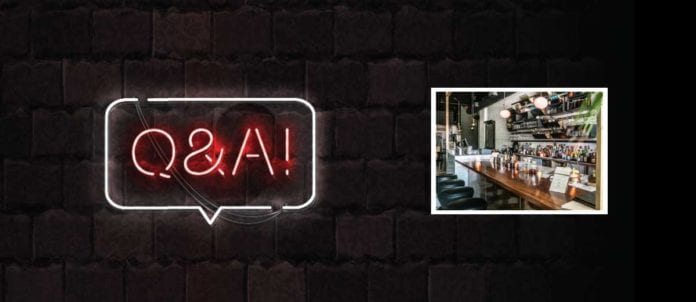Rosanna Caira: What has it been like for you during the COVID-19 lockdown?
Ivana Raca: Everything came as a surprise and everybody took it day by day — and we still are to this day. Everybody was looking forward to spring/summer and had all these amazing plans. And then everybody’s world went upside down and we had to adapt very quickly. When you’re a small restaurant, it’s already hard to get seatings if you’re not having great weather or if you don’t have a patio to begin with, which we didn’t, but we do now. And so, we adapted quickly and were one of the first restaurants to get the “takeout dinners for two” ready.
We had to think local and everything was a hundred times more difficult. Not knowing the future was the scary part — not knowing what tomorrow is going to bring — but we were in the same boat as everybody else, so all we could do was look forward and adapt to anything and everything, whether it’s doing the dishes or organizing the takeout. Every business owner ended up getting their hands in there every day for every single role and it brought everybody together. But also, you have to do 20 or 30 different jobs in the day — you go from prepping or dishwashing, to making the delivery at the end of the day.
Jennifer Coburn: When we first went into lockdown we were really overwhelmed with the
loyalty from our customers checking in on us. I was so shocked — we were in the middle of a pandemic, people were afraid and [yet] we were getting emails from people just asking ‘how are you? Are you okay?’ That was really surprising to me and those loyal customers were all the first people to order from us. There are a lot of restaurants in the industry and the pie is not big enough for everybody to have a slice. It’s not affordable to get takeout every day. So, thank God our clients were fortunate enough that they could do that every week, which is incredible and amazing. And the least we could do was, obviously, bring them great service and delicious food.
RC: Take us through the process of pivoting to takeout?
IR: [I was] working for free because you’ll do anything that you can to have a restaurant
survive and [wear many] hats — you prep, you cook, you know you didn’t have a dishwasher. We kept our team very small. Everything was made from scratch, so of course it makes it a little harder because you [need to] stay true to the food and make sure you’re still delivering the same kind of food as when they come in [to dine]. You can cut corners, but still do the right things the right way. [For example,] sometimes I would do the last delivery and when we were able to hire staff back, our servers would be the drivers; they would organize the takeout orders and call the clients. Running a restaurant is one of the most difficult things you can do and I praise anybody who signs up for it. But this was hard, and everybody felt it, but all we could do is take it day by day and go with the waves just to survive.
RC: Were you able to take advantage of some of the benefits the government was putting forth, whether it was the $40,000 forgivable loan or the 75-per-cent wage subsidy?
JC: That’s obviously a huge issue right now. When the government tells you, legally you can’t open your business, I don’t know how you’re legally responsible for your financial responsibilities. It’s expensive to run a restaurant [and] I don’t know very many restaurants that have millions of dollars in the bank. We did get the $40,000 loan from the government, so that’s super helpful. We have a small restaurant, so that means that we don’t have huge overhead in terms of rent and that makes it a little bit easier, because paying a percentage is not that much money.
RC: Do you feel the government has done a good job of listening to the restaurant industry in terms of what it needs to survive and get through this?
JC: Definitely not in the first couple weeks, when they’d make an announcement and then,
for a few weeks, there was no mention of anything — everybody was scared we were forgotten. We’re lucky that we didn’t have a $60,000-rent space downtown. I can’t picture big restaurants that had to lay off 300 staff — I can’t even imagine being in that situation. There’s nobody in the restaurant industry that has that kind of money just sitting in the bank. Every restaurant needs to be open and successful five days a week for you to [show any] profit.
[On the other hand,] I was actually shocked at how quickly they removed the red tape for some things, [such as] getting CERB — what a blessing to be in a country that just hands you cash. And then there were the patios — [the government] made that change right away.
RC: Some operators and chefs have also pivoted to selling more retail items, did you also do that? And if so, how did that work?
IR: We didn’t do the retail part. but if we had a customer call us and tell us ‘we would love to have this,’ we’d sell it to them. It was the least we could do for them for supporting us when there’s so many restaurants that wanted that clientele. [In terms of delivery,] what benefited us was that we didn’t care where you lived — if we could do it, it happened — and the fact that we did that was a huge plus.
RC: How did the supplier community work with you through this period and did you have to change any of your purchasing processes?
IR: Being an Italian-forward restaurant, there were no containers coming from Italy [with ingredients]. Our business partner did her research and we supported local — the most important thing was supporting within our community. And, even if it took two-and-a-half hours to go get our trout — our business partner did it every week — we did it. We actually got amazing prices and were fortunate enough that our business partner got to meet a lot of amazing people. Before all this happened, we wouldn’t have had the time or we would make excuses — we’re so busy doing 200 different jobs a day, by the end of the day, you’re mentally and physically exhausted, you’re not thinking about going to a farm to pick up 12 pints of raspberries or going to the [food] terminal — but this was a good way for the community to connect with each other and support each other in this time.
RC: Moving forward, do you think you’ll be changing some of your normal procedures to incorporate some of what has had to transpire over the last few months?
JC: I hope people will continue with the takeout. I think they now realize how great it is to have our food in their home and they probably wouldn’t have thought about it before. Very rarely are you going to order takeout from a semi-fine-dining restaurant.
So, hopefully that stays strong. And then there’s some little things, like I said, such as the patio. I hope that continues on. We do a QR code, right now on the table, so we’re not handing out menus. Not only does that save us monetarily on menus, but it’s quick — it just pops up on your phone. And, hopefully we figure out something with Uber. Even though there are some other [third-party delivery companies], they don’t have the same type of power Uber has. But the problem is, of course, that everybody knows it overcharges at 30-per- cent [commission]. It’s very high and leaves almost no room for the restaurant to make any money. [Uber] is worth millions, for sure, but that’s off the backs of restaurants that are struggling to survive. And, at this time, it was in bad taste to charge so much.
RC: What do you think the long-term impact of COVID-19 will be on smaller, independent operators?
JC: Unless we continue to get financial support from the government for wages and rent, it’s going to be really difficult to survive until we’re at 100-per-cent occupancy. The social distancing and whatever other restrictions are going to come from COVID-19 are not going to go away until there’s a vaccine.
IR: There have been a few of our employees that are getting CERB and don’t want to come back to work, or they’re nervous or don’t feel comfortable, and we respect that. We’re just taking it day by day. And, we’re just very grateful that we have this patio because we would be back to the takeout. And, now that we’re getting takeout and the patio, it’s amazing.
RC: What does Stage Three of re-opening look like for your restaurant?
IR: We have a small restaurant, so for us to socially distance, there’s going to be about four tables, but that’s fine, we have the full patio. There are restaurants with air conditioning and a giant space and I’m sure they’re going to benefit from Phase Three. For us, it’s an added bonus.
RC: What type of safety policies are you implementing in the restaurant? Will you be installing plexiglass?
IR: Servers definitely wear masks and we [struggle with the plexiglass] question. We have a cozy ambiance, so are people going to want that? [Customers] can’t sit at the bar because our bar’s tiny and the pathway is non-existent — it makes it super tight for the inside and, in October, when the patio does close, that’s another adjustment that we’re going to have to do.
RC: Many people are saying COVID-19 has highlighted the flaws that have always existed in the industry. Is this a good time and opportunity to change the hospitality industry in more positive ways?
JC: There may be a lot of good that comes out of it in terms of the way the structure of the industry operates. If we’re talking about the restaurant industry being flawed, I would just say the number-1 thing about owning a restaurant is there’s very low margins. The reality is that if the restaurant doesn’t make money and it doesn’t financially support the people involved, then we can’t exist. This isn’t about making billions off your back here, it’s literally survival. Another thing is that people expect restaurants to donate food and time and I find it super strange. We’re not some giant corporation that has millions of dollars in the bank and can just do these types of things. We want to donate some of our time, like with Open Kitchen. That’s a big initiative — we were doing a dinner a month for a while and having support from the community and other shops was huge. And then we would donate all of that money. None of it was for us — we donate all that money to a scholarship, just to encourage girls to get into the industry because there’s a discrepancy in the numbers there.
RC: As a woman in the industry, I’m sure you’ve had your share of challenges. Do you feel that we’re going far enough or quickly enough to move the needle on gender equality? What would you like to see change in a quicker fashion?
IR: I’ve been in the industry 20 years and I was mentored by two very talented men, Martin Cuban, Sash Simpson, and, of course, Rob Gentile and Ryan Campbell. But, as a woman, I feel like there is a boy’s club, so women should do the same because sometimes there isn’t that support. We started Open Kitchen because why aren’t women meeting up with women and having these great women’s clubs? You see men do it all the time and women need to support each other a lot more instead of seeing each other as a threat —especially if you’re up and coming. My sister always says, ‘Oh, you’re so lucky. You’re everywhere’ and it’s not that I’m everywhere — I work very hard to be at the top, to be recognized as a female chef, because I’m surrounded by 99 per cent men. And what’s going to make me special, I know, is my drive. But I know you do have to have a soft side where people will connect and want you because you’re a role model, but you also can come off as being too strong or too dominant and right away you’re pronounced as a bitch.
RC: There’s been a lot of work being done to help women, but there’s also issues around racism. What does the industry need to do to ensure it treats people more equitably?
IR: A lot has to be done. I feel like we’re on the right path, but there’s so much to do and there’s so much that is holding a lot of people back. It’s leading by example, having those weekly meetings with your employees and encouraging your staff that if they see something, report it — it needs to be dealt with right away. In the industry 20 years ago, a lot of things were ignored and women were putting up with things — those times are changed. Every person needs to set an example and be an example and be held accountable for their actions.
RC: What are some of the biggest lessons you’ve learned through the pandemic?
JC: Don’t give up. I wasn’t sure at first that what we were doing was going to be okay or was going to help us make it through or be enough. But the loyalty and customer support just blew me away — that people were thinking about us in such a strange time. So that for me was an amazing part of this experience. And just adapting and learning how to be different in a weird time.
IR: Adapting was the biggest thing and I feel like we did such a good job. To this day, everybody’s doing whatever they can every week, and we’re just going to
continue doing what we need to do to survive.


















